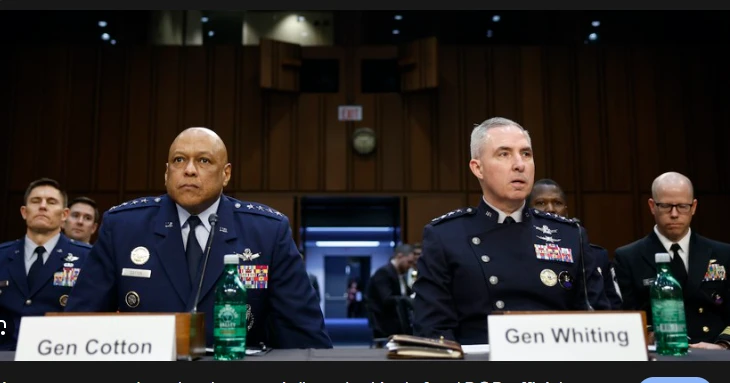US commander sees 'breathtaking' development of China's space power

Stay tuned with 24 News HD Android App

China's military capabilities in space are developing at a "breathtaking" pace that only looks set to intensify after recent defence reforms, the head of the US Space Command said Wednesday.
General Stephen Whiting told journalists that Beijing had "tripled the number of intelligence surveillance and reconnaissance satellites on orbit" in just six years, with repercussions across military domains.
"Frankly, the People's Republic of China is moving at breathtaking speed in space and they are rapidly developing a range of counter-space weapons to hold at risk our space capabilities," Whiting said.
Describing China as the United States' top "pacing challenge", Whiting said Beijing had used "space capabilities to improve the lethality, the precision and the range of their terrestrial forces".
China's leaders had underscored future space ambitions with recent military reforms, he added.
Beijing on Friday announced the creation of an information support force within the People's Liberation Army, essentially reforming the way cyber, information, logistics and space operations are run.
The changes "further enhance the importance of space and information warfare and cyber operations" in China's military, Whiting said, offering an initial assessment of Chinese leader Xi Jinping's April 19 announcement.
The head of the US Space Command -- a unified combatant command that brings together all service branches including the Space Force -- urged "more transparency" from China, as it develops civilian and military space capabilities.
The world's second-largest economy has pumped billions of dollars into its military-run space programme in an effort to catch up with the United States and Russia.
China will on Thursday send a fresh crew to its Tiangong space station, part of an effort to send astronauts to the Moon and establish a research base on the lunar surface by 2030.
China has billed the International Lunar Research Station as a cooperative and scientifically focused project.
"We've seen the announcements of China's ambitions to go to the Moon and you know, those appear to be exploratory and scientific on the surface," said Whiting.
"But the Chinese aren't very transparent with what they do in space. And so, you know, we hope there's not a military component to that. But we would certainly welcome more transparency."
China warns US
China warned on Wednesday that US military support for Taiwan only increased the "risk of conflict" along the strait, after the US Congress allocated $8 billion in military support for the island.
"I'd like to emphasise that the United States and Taiwan strengthening military ties will not bring about security for Taiwan," foreign ministry spokesman Wang Wenbin said.
"It will only increase tensions and the risk of conflict across the Taiwan Strait, and will ultimately be an act of shooting oneself in the foot," Wang warned.
The US Congress gave final approval on Tuesday night to a $95 billion package of assistance to allies including Ukraine, Israel and Taiwan.
Taiwan's incoming president Lai Ching-te has said the aid package will "strengthen deterrence against authoritarianism" and "safeguard peace".
But Beijing, which has said it would never renounce the use of force to bring the island under its control, warned on Wednesday of "resolute and effective measures to safeguard its sovereignty, security and territorial integrity".
Closer military aid cannot "save the doomed fate of Taiwan independence", Wang warned.
"The United States should... stop arming Taiwan, stop creating new tensions in the Taiwan Strait, and stop jeopardising peace and stability across the Taiwan Strait," he said.
